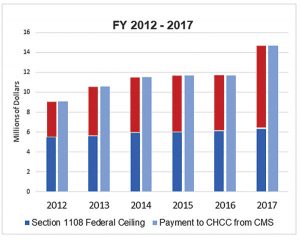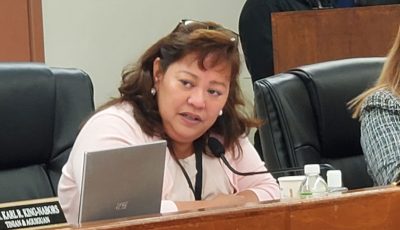CHCC report: Revenue at $58.6M in FY 2019
The Commonwealth Health Care Corp. is highly dependent on CNMI Medicaid’s ability to pay for services, as reimbursements from the agency is about 44% of its total revenue.
In its fiscal year 2019 Citizen Centric Report, CHCC said its total revenue in fiscal year 2019 was $58.57 million. Of that number, $23.35 million or 44% came from private payers, Medicare, and other sources of funding.
Private payers included Aetna Inc., Calvo’s Insurance, Staywell Insurance, Moylan’s Insurance, TakeCare Insurance, and Veterans/Tri Care Insurance. Other revenue comes from sources such as the cafeteria and various fees charged by CHCC.
CHCC also reported that it received just $704,544 from local appropriations in fiscal year 2019, amounting to just 7% of its total appropriations.
CHCC reports that it also received funding from the Centers for Medicare and Medicaid Services and from the Social Security Office’s Section 1108, which provides funding to U.S. territories for health care under a certain price ceiling.
On the other hand, CHCC’s lost revenue potential in fiscal year 2019 totaled $77.23 million, with $18.85 million (25%) falling under uncompensated care.
In addition, CHCC reported spending a total of $70.33 million in fiscal year 2019. About 77% ($44.46 million) were spent on personnel and medical supply costs, while the remaining 23% ($25.87 million) were operational expenses at the hospital.
CHCC’s response and recovery operations after Super Typhoon Yutu also resulted in an additional expense of $3.15 million

Chart indicates the funding the Commonwealth Health Care Corp. receives through Section 1108 and payments from the Centers for Medicare and Medicaid Services from fiscal years 2012-2017. The red bars indicate the amount of money the CNMI government would have needed to pay CHCC during these years without additional Affordable Care Act funds. (CHCC FY2019 CITIZEN CENTRIC REPORT)
Without improvements to Medicaid and other third-party reimbursements, and a reduction in the uninsured population, CHCC says it will be “significantly hindered” from meeting its primary goal of providing quality and affordable care to the community and the CNMI.
“If cuts are made [on Medicaid funding], the CHCC would likely see an increase in charity and uncompensated care,” the report also states.
Since 2011, the CNMI Medicaid Office has benefitted from additional funding from the Affordable Care Act. Yet starting in October 2019, federal funding for the program has returned to pre-2011, as U.S. President Donald Trump has been pushing to repeal the ACA; this means the CNMI government will need to significantly contribute additional funding for the Medicaid program, or make significant cuts to benefits and/or eligibility.
The CNMI Medicaid Office reports that roughly 28% of the CNMI’s population relies on Medicaid in order to afford access to health care. Yet many CNMI residents are non-U.S. citizens, which makes them ineligible for Medicaid.
Despite these severe financing challenges, the CHCC report claims that it has made significant strides towards financial stability, with further gains expected in the future.
“CHCC’s financial stability could improve with the reduction of the rate of uninsured patients in the CNMI through mechanisms such as employer-sponsored and government-sponsored health insurance,” the report said.



























